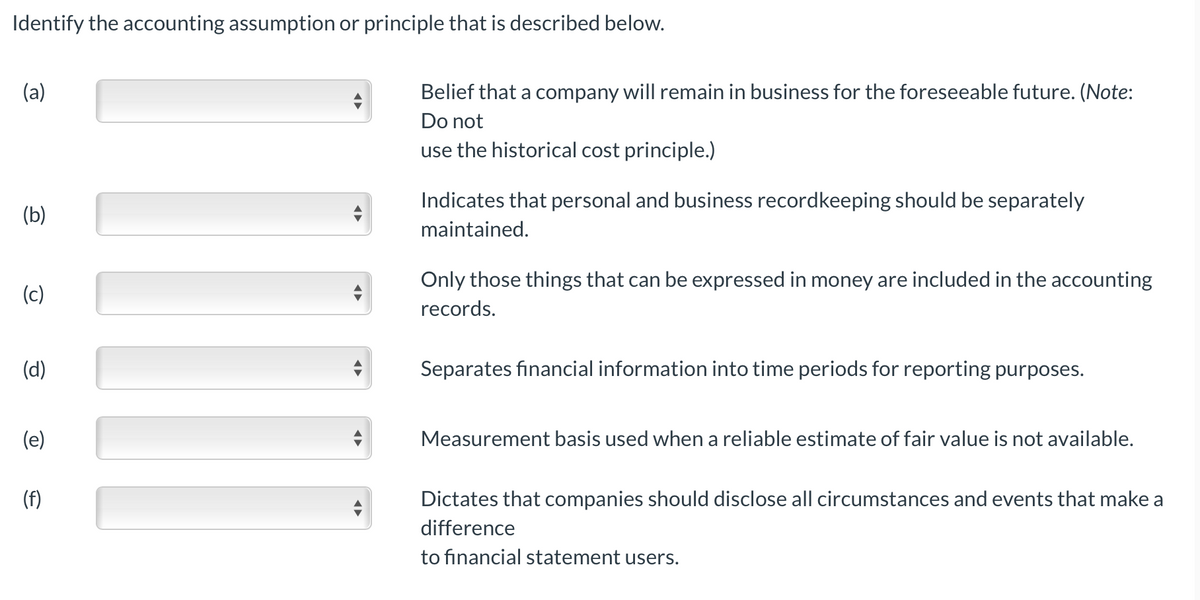(a) Belief that a company will remain in business for the foreseeable future. (Note: Do not use the historical cost principle.) Indicates that personal and business recordkeeping should be separately (b) maintained. Only those things that can be expressed in money are included in the accounting (c) records. (d) Separates financial information into time periods for reporting purposes. (e) Measurement basis used when a reliable estimate of fair value is not available. (f) Dictates that companies should disclose all circumstances and events that make a difference to financial statement users
(a) Belief that a company will remain in business for the foreseeable future. (Note: Do not use the historical cost principle.) Indicates that personal and business recordkeeping should be separately (b) maintained. Only those things that can be expressed in money are included in the accounting (c) records. (d) Separates financial information into time periods for reporting purposes. (e) Measurement basis used when a reliable estimate of fair value is not available. (f) Dictates that companies should disclose all circumstances and events that make a difference to financial statement users
Financial Accounting: The Impact on Decision Makers
10th Edition
ISBN:9781305654174
Author:Gary A. Porter, Curtis L. Norton
Publisher:Gary A. Porter, Curtis L. Norton
Chapter1: Accounting As A Form Of Communication
Section: Chapter Questions
Problem 1.15MCE
Related questions
Question

Transcribed Image Text:Identify the accounting assumption or principle that is described below.
(a)
Belief that a company will remain in business for the foreseeable future. (Note:
Do not
use the historical cost principle.)
Indicates that personal and business recordkeeping should be separately
(b)
maintained.
Only those things that can be expressed in money are included in the accounting
(c)
records.
(d)
Separates financial information into time periods for reporting purposes.
(e)
Measurement basis used when a reliable estimate of fair value is not available.
(f)
Dictates that companies should disclose all circumstances and events that make a
difference
to financial statement users.
Expert Solution
Step 1
Since you have posted a question with multiple sub-
Accounting assumptions and principles are the rules to be followed by the business organizations for conducting their day-to-day business operations effectively and for the preparation of financial statements. They ensure the consistency, reliability and accuracy of financial statements.
Trending now
This is a popular solution!
Step by step
Solved in 2 steps

Knowledge Booster
Learn more about
Need a deep-dive on the concept behind this application? Look no further. Learn more about this topic, accounting and related others by exploring similar questions and additional content below.Recommended textbooks for you

Financial Accounting: The Impact on Decision Make…
Accounting
ISBN:
9781305654174
Author:
Gary A. Porter, Curtis L. Norton
Publisher:
Cengage Learning

Principles of Accounting Volume 1
Accounting
ISBN:
9781947172685
Author:
OpenStax
Publisher:
OpenStax College

Survey of Accounting (Accounting I)
Accounting
ISBN:
9781305961883
Author:
Carl Warren
Publisher:
Cengage Learning

Financial Accounting: The Impact on Decision Make…
Accounting
ISBN:
9781305654174
Author:
Gary A. Porter, Curtis L. Norton
Publisher:
Cengage Learning

Principles of Accounting Volume 1
Accounting
ISBN:
9781947172685
Author:
OpenStax
Publisher:
OpenStax College

Survey of Accounting (Accounting I)
Accounting
ISBN:
9781305961883
Author:
Carl Warren
Publisher:
Cengage Learning

Cornerstones of Financial Accounting
Accounting
ISBN:
9781337690881
Author:
Jay Rich, Jeff Jones
Publisher:
Cengage Learning

College Accounting, Chapters 1-27
Accounting
ISBN:
9781337794756
Author:
HEINTZ, James A.
Publisher:
Cengage Learning,

Auditing: A Risk Based-Approach (MindTap Course L…
Accounting
ISBN:
9781337619455
Author:
Karla M Johnstone, Audrey A. Gramling, Larry E. Rittenberg
Publisher:
Cengage Learning